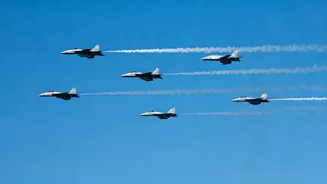Airspace Incursion Incident
The crux of the matter revolves around the unauthorized entry of three Russian MiG-31 fighter jets into Estonian airspace. This occurred near Vaindloo
Island, situated roughly 100 kilometers (124 miles) from Tallinn, the capital. The jets remained in Estonian airspace for a duration of 12 minutes, a period that prompted immediate international concern. Estonia reported the incident, citing the absence of prior permission. This prompted an emergency meeting of the UN Security Council and an urgent consultation with other NATO members under Article 4 of the NATO treaty, illustrating the seriousness with which NATO views airspace violations. The violation has the potential to further destabilize the already tense situation between Russia and NATO member countries, emphasizing the need for a clear international response. This incident follows a Russian drone incursion into Polish airspace, heightening concerns.
US Response & Condemnation
The United States, through its UN Ambassador Mike Waltz, responded strongly to Russia's actions. Waltz condemned the incursions, emphasizing the US and its allies would defend every inch of NATO territory. He addressed the UN, calling Russia to uphold international peace and security and respect the sovereignty of its neighbors. This condemnation also highlighted the US stance on the ongoing war in Ukraine, urging Russia to cease actions that risk escalating the conflict. The US reiterated its support for its NATO allies. The US has called on Russia to end the war and stop actions that could lead to a broader conflict. Ambassador Waltz made it clear that these actions would not be tolerated, and the US stands firmly with its allies in defending NATO's borders. The repeated violations, as pointed out by Waltz, suggest a concerning pattern of disregard for international norms and sovereignty.
NATO's Collective Defense
The incident has triggered Article 4 of the NATO treaty, facilitating urgent consultations among the alliance's 32 members. This article allows member states to discuss any threat to the territorial integrity, political independence, or security of any party. The invocation signifies that NATO members are taking the airspace violations very seriously. The commitment to collective defense, as reaffirmed by the US, underscores the principle that an attack on one member is considered an attack on all. The rapid response and unity shown by NATO demonstrate the strength of the alliance and its resolve to deter aggression. The alliance is designed to act as a deterrent against potential aggression and ensures that any violation will be addressed collectively.
Russian Rejection & Warning
Russia, in response to Estonia's allegations, rejected the claims and warned that such accusations risked escalating tensions. Dmitry Peskov, the Kremlin spokesman, labeled Estonia's statements as “empty, unfounded”. This response underscores the ongoing tensions and the contrasting narratives between Russia and the West. The Russian stance reveals a refusal to acknowledge the violation of airspace, which further complicates the diplomatic efforts to de-escalate the situation. This stance is consistent with its ongoing policy of escalating tensions. Russia's denial and warning highlight the challenge of achieving a peaceful resolution and restoring mutual trust. The response reveals the Kremlin's perspective that it is not at fault and that accusations are politically motivated.




















